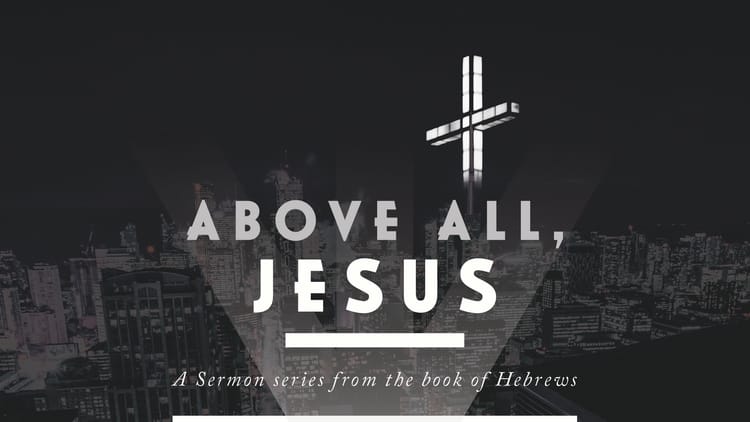How Can We Know There Is a God? (Hebrews 1:1-3)

Big Idea: How can we know God exists? Through creation, Scripture, and most of all, his Son.
The vast majority of Canadians still believe that God or a higher power exists, but the number of people who don’t believe in God is on the rise. In 1975, when Canadians were asked if God or a higher power exists, 6% said, “No, I definitely do not.” The numbers stayed the same, right at 6%, in 1985 and 2000. In 2015 they did this study again, and found that the number doubled. Now 13% of Canadians assert that there is no God or higher power. They are still a small number, but they are growing.
But there’s another group, and those are the people who are less dogmatic, but still skeptical. Angus-Reid says that you can divide Canada up into three groups. One group embraces Christianity or other faiths. A second group — almost as bit as those who embrace faith, and growing — are those who reject it. And then there’s a third group that considers themselves somewhere in-between.
Those are the statistics, and then there are the people that we meet. In my experience, it’s not hard to find an atheist or agnostic in Liberty Village. I’ve encountered many people who are open to the existence of God, but I’ve also encountered many who flat-out call themselves atheists.

So let’s ask the question: How can we know there is a God? What proof do we have that God exists? This is a big question, and it has huge implications for our lives. Let’s nail down the question so that we’re really clear: “Is there a Supreme Being that deserves our worship and gives meaning, purpose, and direction to the universe and to human life?” (What’s Your World View?)
And I want to begin by acknowledging that what I will offer falls short of absolute proof. The philosopher Alvin Plantinga believes that there are no proofs of God that will convince all rational persons. Instead, we have literally dozens of good arguments for God’s existence. Taken together, the accumulated weight of these arguments is formidable. In other words, there cannot be irrefutable proof for the existence of God, but there are many strong clues for his reality and existence. We see his fingerprints all over the place. Instead of looking for proofs, one person suggests, we should look for clues, and there are plenty of them.
So today, let’s look at signposts or proofs that point to God’s existence. Actually, they point to something better than God’s existence. They point to a real, personal God who has revealed himself to us, and has taken a personal interest in us. The three signposts are general revelation, the revelation of Scripture, and Jesus. Let me explain.
First, we have the signpost of general revelation.
I could spend hours on this one alone, so let me be as quick and clear as possible. There is a preponderance of evidence that leads people everywhere — in all different cultures and throughout all of history — to conclude that God exists. Calvin Plantinga argues that you don’t need to argue for the existence of God, because this belief is properly basic. But that doesn’t mean that there aren’t good arguments for God’s existence. He outlines quite a few in a paper called Two Dozen (or so) Theistic Arguments. Here are just four.
Cosmological — One of the evidences for the existence of God is that anything exists at all. Why is there something rather than nothing? The law of causality teaches us that every finite thing is caused by something else. Therefore, the universe has to be dependent on something outside of itself. But what? Logic would argue that there has to be something or someone outside of nature — a supernatural, non-contingent being. That’s one clue for the existence of God.
Teleological (watchmaker) — Then there’s the fact that everything is so finely tuned in this universe. “For organic life to exist, the fundamental regularities and constants of physics— the speed of light, the gravitational constant, the strength of the weak and strong nuclear forces— must all have values that together fall into an extremely narrow range” (Tim Keller). It’s like there were a large number of dials that all had to be tuned to within extremely narrow limits, and they were. It seems extremely unlikely that all of this would happen by chance. Any time we see a complex design, we know that it came from the mind of a designer. So it is with the universe. How could our intelligent minds arise out of pure mindless matter without the help or direction of some preexisting intelligence? The most common counterargument is that there are an infinite number of universes, and we just happen to be in the one that is hospitable to organic life, where everything just happened to go right. While possible, it seems less likely. If you were being killed by a firing squad, and 50 soldiers stand 6 feet away at you and shoot at you and you survive, it’s technically possible that all 50 soldiers happened to miss you at the same point. You couldn’t prove that they all conspired to miss you. But which would be the simpler explanation? The design of this universe is a signpost that there is a God who is behind it all.
As I mentioned, there are dozens of these arguments. Let’s just give two more.
Moral — If you took a poll on any number of issues, we would all agree that some actions are immoral. Human beings believe that moral standards exist, and that they are external. For instance, we would agree that human rights exist — that every human being has inherent dignity, and should be treated as such. Why should we believe such a thing? Some argue that it’s because of natural law. The only problem is that natural law is the exact opposite of this. Nature thrives on violence and predatory behavior, and the survival of the fittest. Writer Annie Dillard lived for a year by a creek in the mountains of Virginia expecting to be inspired and refreshed by closeness to “nature.” Instead, she came to realize that nature was completely ruled by one central principle— violence by the strong against the weak. There’s no natural reason to stand up for human dignity, nor is there an evolutionary one. We don’t defend human dignity because it gives us an evolutionary advantage; we don’t defend human rights because it works, but because it’s right. There has to be a basis for morality outside of ourselves, or else all we have is preferences. It makes sense to think there could not be such objective moral facts unless there were such a person as God who, in one way or another, legislates them. It’s very hard to argue how anything can be objectively good or bad if there’s no God to serve as the ultimate standard of goodness.
Beauty — Let’s just look at one more clues: beauty. You’ve experienced this when you see or hear something beautiful. We are moved, inspired, and awestruck by things like nature and art. In the presence of great beauty, we have hope, and we feel that there’s meaning in life, that there is such a thing as truth and justice. There are two explanations. One is that beauty — and love, for that matter — is nothing but a neurological hardwired response to particular data. Or it could be that music, love, and beauty exist not because of its survival value, but because it is part of the very nature of God himself. Beauty and love exist because God himself is beautiful, and because God himself loves.
That’s just a small sampling of the clues in creation, in general revelation, that point to God. When we see them, we realize that none of them are conclusive. None of them are slam-dunk arguments that will convince the most hardened skeptic of the existence of God. There are counterarguments, and much has been written on both sides of the issue. But the evidence is compelling. There are so many clues that point to the reality of God.
If I came home one day and found the door open to my place, and Charlene’s purse on the table in our hallway, and then heard the music she likes to play in the living room, and then heard her voice, all of these would be clues that Charlene was home, even though I hadn’t yet seen her. It is possible that there are other explanations. There may be all kinds of random things that would make it possible for me to experience all these things, but it would be highly unlikely. The most probable explanation for this phenomenon would be to follow the clues and to conclude that Charlene is at home.
In the same way, when we see all these clues — the existence of contingent creation, the intricate design of all things, the sense of rightness and morality, and the beauty and love that surrounds us — it makes sense to follow these clues to where they point: to a God who is behind all that we see. And that’s exactly what the Bible teaches. Romans 1:19-20 says:
For what can be known about God is plain to them, because God has shown it to them. For his invisible attributes, namely, his eternal power and divine nature, have been clearly perceived, ever since the creation of the world, in the things that have been made. So they are without excuse. (Romans 1:19-20)
Somebody has called this “God’s cosmic eloquence.” God speaks eloquently through what he’s made. He’s done this so powerfully that “all persons everywhere have a deep, inner sense that God exists, that they are his creatures, and that he is their Creator” (Wayne Grudem). Some manage to suppress this, but you can’t escape it. Signposts of evidence point us to the existence of God. But there’s even more.
Second, we have the signpost of the revelation of Scripture.
We don’t just have the signpost of general revelation, because that would only be enough to convince us that there is some higher power. It wouldn’t be enough to tell us what he’s like. So God has gone further. He’s given us another signpost, which is the signpost of his revelation through Scripture.
A few minutes ago, we read the passage from the book of Hebrews: “Long ago, at many times and in many ways, God spoke to our fathers by the prophets…” (Hebrews 1:1). This teaches us something profound. Any relationship, any knowledge of another person, is based on self-disclosure. The only way that you can get to know another person is if they are willing to be known. You can tell things about them, but you can’t really know them until they open up and reveal themselves to you. For one thing, unless someone reveals themselves to you, you have to guess what they’re like, and the guesses can be really wrong. I once wrote for a Christian newspaper in Winnipeg and regularly corresponded with the associate editor there. One day I meant the senior editor, and we got talking about what the associate editor was like. Having corresponded with her for some time, I’d constructed a mental image of what she was like — her personality, her looks, the whole deal. It gave the senior editor a good laugh, because I had guessed completely wrong. It’s the same way with God. If all we had was the signpost of evidence, we would have to guess what God is like, and our guesses would probably be wrong. God has to reveal himself in order for us to know him.
This passage says that this is exactly what God has done. He has revealed himself in many ways to instruct the prophets.
God’s people have always had more than the eloquence of the heavens, for they have had the prophets. “In the past,” says the writer, “God spoke to our forefathers through the prophets at many times and in various ways” (v. 1)—literally, “in many parts and many ways.” God was very creative in how he spoke in ancient times. God appeared to Abram in human form, and to Jacob as an angel. God spoke to Moses at Sinai in thunder and lightning and with the voice of a trumpet. He whispered to Elijah at Horeb in “a low whisper” (1 Kings 19:12). Ezekiel saw visions and Daniel had dreams.
Not only that, but when God’s prophets spoke, they used all kinds of methods. Some gave direct oracles from God. Others used questions and answers. Others performed bizarre symbolic acts. Others preached signs. God has been very eloquent in how he has spoken in revelation. Canadian theologian J.I. Packer says:
Christianity…is a religion that rests on revelation: nobody would know the truth about God, or be able to relate to him in a personal way, had not God first acted to make himself known. But God has so acted, and the sixty-six books of the Bible, thirty-nine written before Christ came and twenty-seven after, are together the record, interpretation, expression, and embodiment of his self-disclosure…
God has spoken. He’s given us the signpost of evidence, and he’s also given us the signpost of revelation, contained in Scripture. He’s self-disclosed himself to us.
Before we move on, when have to ask an important question. How do we know that the Bible is from God, rather than just a great piece of literature? If you’re like me, you’re going to be skeptical about accepting claims from people who claim to have heard from God. You just don’t accept that blindly. Actually, there are many compelling reasons to believe that the Bible is God’s self-disclosure, that the words of Scripture are God’s words. Unlike any other book, the Bible offers specific predictions that were written hundreds of years in advance of their literal fulfillment. One person has counted 1817 predictions in the Bible, 1239 in the Old Testament and 578 in the New, 27% of the Bible. They are specific and predictive. “The Bible is filled with specific predictive prophecies that have been literally fulfilled,” writes Norm Geisler. “This is true of no other book in the world. And it is a sure sign of its divine origin.”
There are many other clues that the Bible is divine: the fact that it is written over 1,500 years by people from diverse backgrounds, yet it speaks with a unified message; that “no archaeological discovery has ever controverted a biblical reference” (Nelson Glueck); that millions of lives have been changed in a supernatural way from this book; that Jesus affirmed that it is God’s Word, and more. Norm Geisler concludes:
The Bible is the only book that both claims and proves to be the Word of God. It claims to be written by prophets of God who recorded in their own style and language exactly the message God wanted them to give to humankind. The writings of the prophets and apostles claim to be the unbreakable, imperishable, and inerrant words of God. The evidence that their writings are what they claimed to be is found not only in their own moral character but in the supernatural confirmation of their message, its prophetic accuracy, its amazing unity, its transforming power, and the testimony of Jesus who was confirmed to be the Son of God.
Having read all kinds of books, I can tell you from my personal experience that there is no book like Scripture. There’s nothing else that compares to it. It, along with the evidence we see around us in general revelation, are two compelling signposts that God exists. He’s made himself known. But there’s one more signpost, and it’s the best of all.
Third, we have the signpost of Jesus himself.
In the Christian view, the ultimate evidence for the existence of God is Jesus himself. The other week Nathan mentioned the Russian cosmonaut who went to space and reported that he hadn’t found God. C.S. Lewis responded that this is like Hamlet going to the attic and looking for Shakespeare. If there is a God, he would exist outside of creation, and we wouldn’t expect to find him here — unless, of course, he entered creation, unless the playwright entered the play. “Christians believe he did more than give us information. He wrote himself into the play as the main character in history, when Jesus was born in a manger and rose from the dead” (Timothy Keller).
This is the ultimate signpost. Hebrews 1:1-3 says:
Long ago, at many times and in many ways, God spoke to our fathers by the prophets, but in these last days he has spoken to us by his Son, whom he appointed the heir of all things, through whom also he created the world. He is the radiance of the glory of God and the exact imprint of his nature, and he upholds the universe by the word of his power. After making purification for sins, he sat down at the right hand of the Majesty on high...
You have the evidence of creation. You have the evidence of revelation. But the climax of revelation is Jesus. In fact, Jesus himself said that if you’ve seen him, you’ve seen the Father (John 14:9). Jesus repeatedly claimed to be God. He’s so compelling. If you’re wondering if there is a God, I would encourage you to pick up a Bible and look at the life of Jesus. He was no ordinary man. Read about him. Be amazed by him. There is nobody else like him.
Jesus once told a story that I find fascinating. The story is about a man who planted a vineyard and gave it to tenants to look after it while he went away. When harvest came, he sent a servant to get some of the fruit from the vineyard. Listen to what happened:
And they took him and beat him and sent him away empty-handed. Again he sent to them another servant, and they struck him on the head and treated him shamefully. And he sent another, and him they killed. And so with many others: some they beat, and some they killed. He had still one other, a beloved son. Finally he sent him to them, saying, ‘They will respect my son.’ But those tenants said to one another, ‘This is the heir. Come, let us kill him, and the inheritance will be ours.’ And they took him and killed him and threw him out of the vineyard. What will the owner of the vineyard do? He will come and destroy the tenants and give the vineyard to others. (Mark 12:3-9)
This story is simple, but it packs a punch. It’s a story about the signposts that God has given us. He repeatedly sends people. But eventually he sends his own Son, and we killed him. The question comes down to us today: What will we do with the ultimate signpost? What will we do when we see Jesus, who is God himself, the ultimate signpost pointing us to the reality and existence of God?
We began today by saying that there is no ultimate proof of God, but there are plenty of clues. Someone tweeted something that summarizes this point well:
Christianity is the most universally accepted and verifiably proven belief system in the world BUT salvation is not by argument.
What a great point.
We could spend all day looking at signposts, but in the end we have to admit that signposts can only go so far. Jesus once told another story that spoke of the limitations of signposts. In the story, a rich man dies who doesn’t know God. He wants to send a warning back to his brothers so that they don’t make the same mistake that he did. Listen to what Jesus said:
And he said, ‘Then I beg you, father, to send him to my father’s house—for I have five brothers—so that he may warn them, lest they also come into this place of torment.’ But Abraham said, ‘They have Moses and the Prophets; let them hear them.’ And he said, ‘No, father Abraham, but if someone goes to them from the dead, they will repent.’ He said to him, ‘If they do not hear Moses and the Prophets, neither will they be convinced if someone should rise from the dead.’” (Luke 16:27-31)
That’s the problem. We can have all the evidence in the world, and still have a heart that’s unwilling to see what’s right in front of us. Our ultimate problem isn’t an evidence problem; it’s really a heart problem.
I encourage you to look at the evidence. There are signposts everywhere that God exists. But the evidence is only the evidence. I gave you the example earlier of coming home and experiencing all the evidence that Charlene is at home. It would be a shame if I spent all the time examining the evidence that Charlene was home, and in the process missed Charlene. Look beyond the evidence to the person — to a God who not only exists but is reaching out in love to you, who gave his Son for you, who is present with us today.
Don’t settle for the evidence; settle only when you have God, when you see what Jesus has done for you. Let’s pray.
We thank you for all the signposts that point us to you. Thank you for your eloquence in speaking through creation, through Scripture, and most of all through Jesus. Thank you for the eloquence of the cross, that Jesus loves us enough to not only write himself into the story, but to take our sins upon himself so that we could be brought back into relationship with you.
Help us to see the evidence, but most of all, help us to see you. We pray this in Jesus’ name. Amen.





